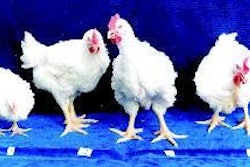.jpg?auto=format%2Ccompress&q=70&w=400)
A food company based near Beijing has become one of China's integrators in the pork sector. Besides processing meat and selling branded products throughout China, Pengcheng is also a significant pig producer. It already provides up to half of all the pigmeat marketed in the Beijing area and by 2010 it aims to be in the Top 3 meat and food companies nationwide, through a policy of maximising its brand potential in pork products by building a nationwide production, processing and marketing system.
Today the company owns 5 units on which it produces about 10% of the pigs that pass through its slaughter lines. Additionally it is involved in contract production. Pengcheng provides the piglets and trains the farmers in feeding and rearing techniques to ensure that the processing plant receives a consistently good-quality animal.
Any company wishing to build and maintain a brand on the Chinese meat market has to establish a reputation for quality and food safety as well as the reliability of the product. For Pengcheng, this has meant installing an ultra-modern plant equipped with the latest automated technology and making sure that the necessary hygiene and safety checks are performed along the line. However, it has also taken the concept of quality production beyond the processing plant and to the close supervision of operations both on its own farms and on those of the contract producers.
What is more, this approach is extending to activities in several parts of China. As well as the processing plants near Beijing, there are other Pengcheng meat factories in Sichuan and Shaanxi provinces.
"We provide the small pigs and all the technology to the farmers and then we buy back the pigs for the slaughterhouse," says Jia Yali. As the plant manager for Pengcheng in Beijing, she also oversees the pig supply arrangements. "We have a contract with the farmers to supply us," Miss Jia adds. "Pencheng is a famous brand in China and we take care with our reputation."
The groundwork for quality pigmeat has to start with the genetics, it recognises, so it has developed a high-health breeding complex at the Beijing Shunxin Ecological Cultivation Yard in the foothills outside China's national capital city. The boars at this complex originate from seedstock breeding companies in the UK, Denmark, France and Belgium. The breeds represented include Large White, Landrace, Pietrain and Duroc.
As company specialists explain, the programme has been established to obtain not only good breeding productivity and growth rates, but also advantages in the form of high muscling and delicious-tasting meat. A modern computer-based system is used for managing the selection of boars to stand at artificial insemination and the management for each boar housed at Pengcheng's own AI station. Breeding research is conducted in co-operation with the China Academy of Agricultural Sciences and the China Agricultural University.
The complex also has facilities researching and using automatic feed distribution and waste management. The feeding regime uses a maize-based diet and is designed to promote good health as well as achieving growth performance targets. Pengcheng is quick to point out that its rearing system guarantees healthy production, so that none of the farms supplying its pigs are tempted to use any of the stream of contraband medicines that can be found on the Chinese market and pose the risk of containing harmful substances.
Pigs sent to the Beijing plant reach an automated slaughter line, featuring equipment from Dutch company MPS, that was established with the opening of the factory in 2004. It can handle 10 000 pigs per day, with shifts starting at 02:00 and continuing through to midday. Automation remains relatively unusual in China given the country's low labour rates. But its adoption in this case has allowed the factory to reduce the time needed for slaughtering, splitting and cutting carcases while also ensuring a high degree of hygiene and food safety.
Stunning before slaughter is by a low-voltage electric system designed to lower potential damage to the meat and bones, reducing the chance of blood-spots and preventing pale, watery (PSE) meat. Automatic sensors arrange that the carcase is split and the belly opened accurately to avoid contamination. The line also uses steam scalding, on the basis that this is more hygienic than using more conventional immersion scald tanks.
The attention to hygiene is seen moreover in a series of safety tests along the production line. In all, there are 18 different procedures. Samples are taken from each carcase and sent by conveyor for testing in an on-site laboratory. Meanwhile a team of 36 meat inspectors is on hand to examine the carcases and the offal as it travels along the line.
Far from excluding the public, Pengcheng has an open-doors policy of allowing any visitors in to see the operation. The Beijing plant even has a purpose-built viewing gallery from which the visitors can observe all parts of the production line including the slaughter point. Plant manager Jia Yali accepts that attitudes in other countries might consider this to be a sensitive area. But the situation is different in China, she says. Pigmeat is regarded as something to eat and there are no scruples among the Chinese people over slaughtering of animals.
Carcases are cooled to a constant temperature of between 2-4°C to bring the meat's pH value to 5.8-6.2. Boning afterwards involves 3 lines working in 2 shifts, each with 200 people, to cut the carcase into joints for placing on their own dedicated conveyor. Fresh pork is vacuum packed for dispatch, while the frozen meat is packed in trays.
Pork with the Pengcheng brand is found today mainly on the domestic market. In Beijing alone there are more than 2000 sales sites for the company's fresh meat products. While most sales go through retail outlets, the company also supplies the foodservice sector by providing products for restaurants, hospitals and schools. A fleet of 200 refrigerated vehicles distributes about 600 tons of meat products to 200 stores in Beijing every day on a just-in-time basis.
Already, an export business is building the Pengcheng name in some other Asian countries such as Japan, Korea and Thailand and there is the start of a small trade in frozen meat to Russia. Exports currently account for only 1% of total turnover, however. According to Jia Yali in Beijing, the company does not export more at present for the simple reason that it can receive a better price for its products within China. Evidently therefore the domestic business will remain its first target for further growth, as a pork retailer and as an integrator.PIGI
















